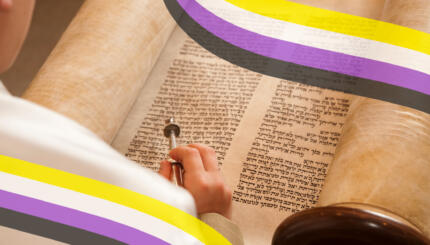The simple answer, of course, is no. Bar/Bat Mitzvah is one of the most popular Jewish rituals in the United States Today. There is something deeply human about wanting to mark the end of childhood, which a bar/bat mitzvah effectively does. Marking at twelve, for a girl, and thirteen for a boy that they now have new responsibilities as they enter adolescence is a profoundly moving experience for both the emerging teenager and his or her family.
And yet the bar/bat mitzvah ritual is experiencing a period of disruption. Rabbis are recognizing a growing need to tailor the bar/bat mitzvah experience to a particular child or family. The one size fits all “bar mitzvah factories” of old no longer apply. Three recent examples heralding this change have come to my attention.
Just this week the New Jersey Jewish News published a story about Congregation B’nai Israel in Milburn NJ led by Rabbi Steven Bayar. Rabbi Bayar is changing the focus of the bar/bat mitzvah ritual from the emphasis of the child having to chant the haftorah portion to leading a larger segment of the service itself. He argues that understanding the service and having the skill to lead it will better prepare teens to engage in Jewish life as they grow older than learning a haftorah portion which is only recited once a year.
Rabbi Michael Knopf of Temple Beth El in Richmond, VA is also overhauling the bar/bat mitzvah experience for the teens in his congregation. In his blog he lays out an approach for an individualized experience for the teen and their families so that they can study together, identify what is most important to them, and develop a Jewish ritual to mark the occasion which may or may not take place in on Shabbat. It is an individualized approach focusing on the needs of a particular student and tailoring their Jewish learning to meet their needs.
Rabbi Andrew Jacobs of Ramat Shalom synagogue in Plantation, FL is taking things one step further by integrating technology in to the experience. He has developed a strong on line curriculum of learning where by a student can learn remotely with a tutor and study at times that fit their schedule. His program is called Chai Tech “With an internet connection and a computer, tablet or smartphone, bar/bat mitzvah students can prepare for their big day wherever they are, whenever they can. No more schlepping to the synagogue or the tutor. Once you go Chai Tech, bar/bat mitzvah preparation works easily into your busy schedule. Everything is online – including a teacher who monitors your child’s progress and keeps you informed using an advanced, online learning management system. “
These are only three examples of how preparing for and experiencing the ritual of bar/bat mitzvah is being challenged and changed across the country.
The article about Rabbis Bayar’s changing the focus of the bar/bat mitzvah ceremony from haftorah to prayer has stirred up a lot of commentary on line among Jewish professionals. Comments have ranged from, “There is nothing innovative here. My synagogue has done this for a long time.” To “Why would you do this? Kids should learn how to chant haftorah and lead services.” Many of the comments have, I think missed the larger message here which is that we are at a time of radical rethinking about the bar/bat mitzvah ritual. We know that the ritual itself is important and sacred. We want to keep marking this transition in a young person’s life. However, how this ritual is prepared for and celebrated is being completely rethought.
Though changing ancient rituals is always scary, I think this is a good thing. There is actually no Jewish law surrounding the bar mitzvah ceremony. A child simply becomes bar/bat mitzvah on her twelfth birthday for a girl, or thirteenth birthday for a boy. This entry in to Jewish adulthood was often marked, for a boy, by having him honored by being called up to the Torah, receiving an aliyah. Chanting the Torah, haftorah or leading services are all modern day inventions added to mark this moment of transformation. They are not required.
I do not know where this time of experimentation will end. I too agree that Jewish literacy is important. Children and families should have to learn and prepare to mark a bar/bat mitzvah. But Jewish wisdom is expansive and deep. There are many options on what we can do here. I am hopeful that rabbis, cantors and Jewish educators across this country who work with teens and families to prepare to mark their bar/bat mitzvah will be able to identify what their current spiritual needs are and craft the appropriate course of study and celebratory ritual to honor them. I would love to hear new thoughts, ideas and practices. Please share them with me and I will report on what I learn.
Hazak, hazak v’nitchazek – may we go from strength to strength as we explore the boundless potential of Judaism to add meaning to our lives.
bar mitzvah
Pronounced: bar MITZ-vuh, also bar meetz-VAH, Origin: Hebrew, Jewish rite of passage for a 13-year-old boy.
mitzvah
Pronounced: MITZ-vuh or meetz-VAH, Origin: Hebrew, commandment, also used to mean good deed.



